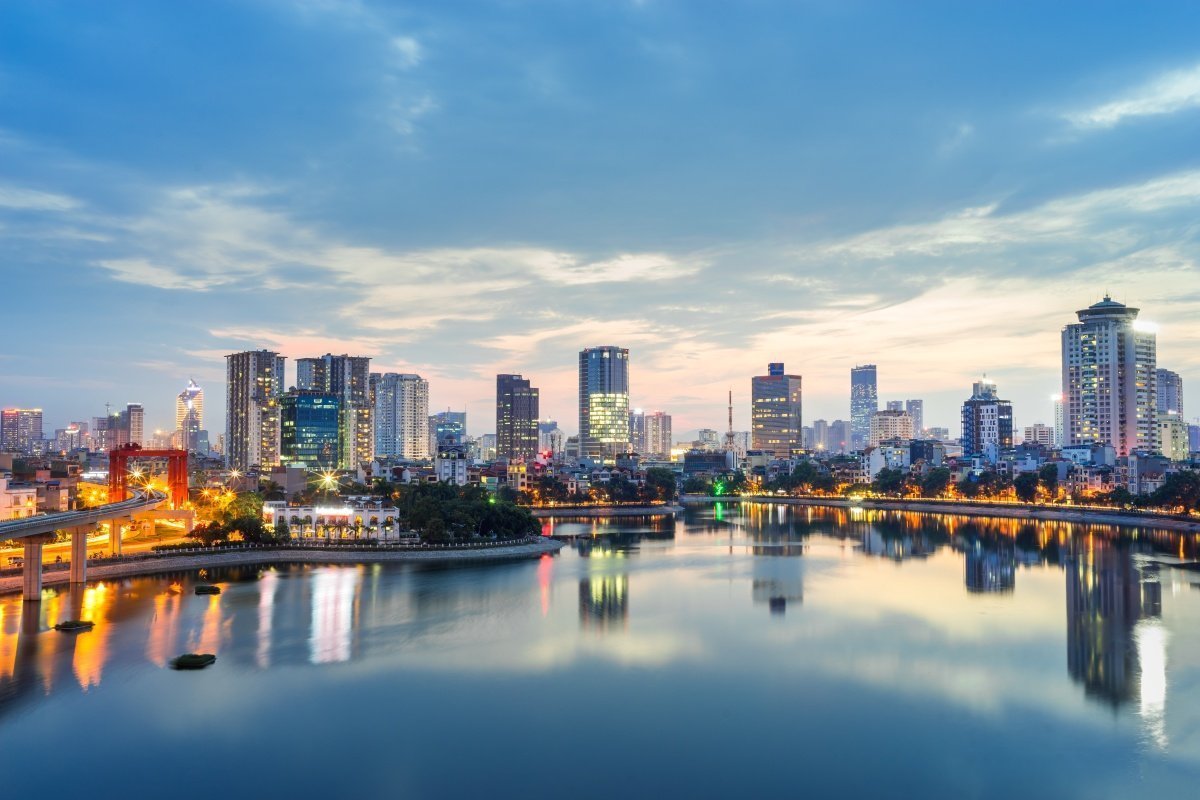
Hanoi set the target to turn into a smart city by 2030 in accordance to the capital’s revised information and technology strategy in the 2016-2020 period.
Foundations established
Phan Lan Tu, director general of the Hanoi Department of Information and Communications, said that the four priority sectors chosen to build the smart city are health, education, transport, and tourism. Since 2017, all four of these sectors have been developed in combination with the development of e-government and administrative reforms to lay the foundations of a smart city.
Regarding urban transportation, Hanoi has applied iparking to search for parking lots and pay for parking through mobile devices. This application will soon be deployed in all districts of Hanoi. Hanoi’s digital traffic map will be deployed to provide information on traffic status and manage public passenger transport in the city.
Regarding education, electronic school reports and family-to-school contacts as well as an online enrollment system has been put in use by 2,700 schools and universities, with the participation of 250,000 families and 6.3 million page views. The rate of online applications at the three levels of primary, secondary, and high school hit 70.68 per cent.
Regarding health management, Hanoi is the first locality to implement e-documents in its health management system, with 900,000 records so far.
Besides, a database of 7.5 million people has been built to set up an application to serve people, enterprises, and city management.
Becoming a smart city is the essential orientation of Hanoi.
Nguyen Duc Chung, Chairman of the Hanoi People’s Committee confirmed that becoming a smart city is the essential orientation of Hanoi.
Core elements of a smart city
Based on smart cities established over the world, experts have concluded the core tasks Hanoi needs to complete. First, the city needs to be built on modern information technology and communication (ICT) infrastructure utilising the Internet of Things. People will be connected to their houses, as well as equipment, traffic, and vehicles, among others. Thereby, it is necessary to set up modern infrastructure in transport, healthcare, and education.
Second, citizens the city boasts very low levels of unemployment and relatively high incomes. This is the most important element in building a smart city.
Third, they need dedicated expert teams to manage and operate the technical system of the new smart city.
As a result, the process of building Hanoi as a smart city will include three phases. The first phase (2016-2020) will form the infrastructural foundations and build smart applications on traffic, tourism, environmental management, and security.
The second phase (2020-2025), people will be the stage to take smart city solutions into operation, and form the digital economy. In the third phase (2025-2030), Hanoi will become a functioning smart city.
Challenges along the way
Hanoi is in a good position as it is easy to mobilise investment from domestic corporations such as Viettel, VNPT, FPT, and CMC, and foreign ones like Microsoft.
Various countries with experience in smart city development expressed a wish to co-operate with Hanoi in this sector.
At a meeting with leaders of Hanoi, Prime Minister Lee Hsien Loong said that Singapore wants to invest and develop hi-tech parks and software industrial zones in Hanoi, strengthening co-operation in smart city development. Singapore is ready to welcome officers from Hanoi in particular and Vietnam in general to participate in training courses in Singapore, especially at Lee Kuan Yew School of Public Policy.
Nearly 80 per cent of professors and associate professors, over 80 per cent of leading experts, and more than 35 per cent of universities and research institutes are working and located in Hanoi.
However, Hanoi still has to face many difficulties and challenges to become a smart city, such as ICT infrastructure, general technical infrastructure, traffic jams, water shortages, waterlogging, wastewater treatment, and environmental pollution.
| Hanoi still has to face many difficulties and challenges to become a smart city, such as ICT infrastructure, general technical infrastructure, traffic jams, water shortages, waterlogging, wastewater treatment, and environmental pollution |
Besides, Hoang Trung Hai, Secretary of the Hanoi Party Committee, said that it is very difficult to ensure enough qualified human resources for smart city development and operating the e-government. Technology, which is an important foundation of a smart city, will connect the government to businesses and people, but human resources are key.
Despite the difficulties and challenges ahead, Hanoi has prepared well for smart city development. The Hanoi People’s Council has just approved the resolution adjusting the city’s programme on applying information technology in the operations of Hanoi’s state agencies until 2020. The programme’s budget has been adjusted from VND1.252 trillion ($55.2 million) to VND3 trillion ($132 million) to develop e-government and socioeconomic sectors.
Hai also required to synchronously develop urban and rural infrastructure, promote administrative reforms, as well as improve the investment climate and quality of human resources.
Source: VIR

